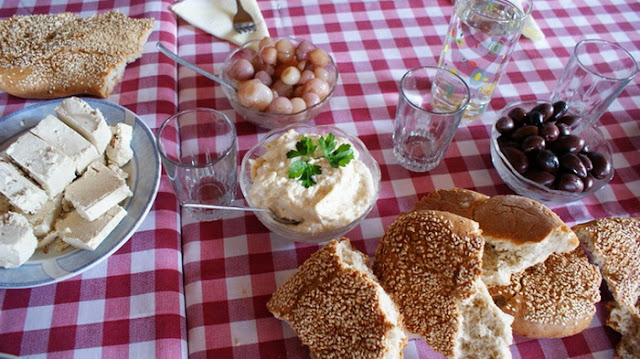Clean Monday also puts an end to the preceding Carnival celebrations, inviting all Orthodox Christians to leave behind the sinful attitudes associated with Carnival festivities and non-fasting foods, which were largely consumed during the three weeks of the Carnival.As a result, the feast, which is a public holiday in Greece and Cyprus, is celebrated with outdoor excursions, the consumption of shellfish and other fasting foods, as well as the widespread custom of building and flying kites.
Culinary Delights of Clean Monday
Eating meat, eggs and dairy products is traditionally forbidden to Orthodox Christians throughout Lent, with fish being eaten only on major feast days. The consumption of shellfish and mollusks though, is permitted in Greek Orthodox Churches, thus creating the tradition of eating elaborate dishes based on seafood, like cuttlefish, octopus and different shellfish, like shrimp and mussels. A traditional dip made of the salted and cured roe from carp or cod, mixed with olive oil, lemon juice and bread crumbs, called “taramosalata,” is also part of the products consumed on Clean Monday.Taramosalata is ideal for spreading on the “lagana,” a special kind of unleavened flatbread, baked only on that day. The history behind this bread dates from the Old Testament and to the help offered by God to the Israeli people while guiding them from Egypt to their promise land. Since then, Israelis have baked the lagana throughout the Easter period, hence introducing the tradition to the Orthodox Church.Accompanying these delights are also black-eyed beans or just common baked beans, grape-leaf wrapped rice balls called “dolma” and of course some Greek wine or tsipouro.As for dessert, an alteration to the familiar Arab “halva” is served, which is made of tahini, a sesame paste, and sugar, often combined by nuts or chocolate and baked in a square or cylindrical shape.
AMAZONES HOTELS CRETE
SUMMER 2016
Amazones Village Suites - Amazones Villas - Amazones Sun
http://www.amazoneshotels.com
email:amazones@hol.gr
Save Up to 35% Now!
